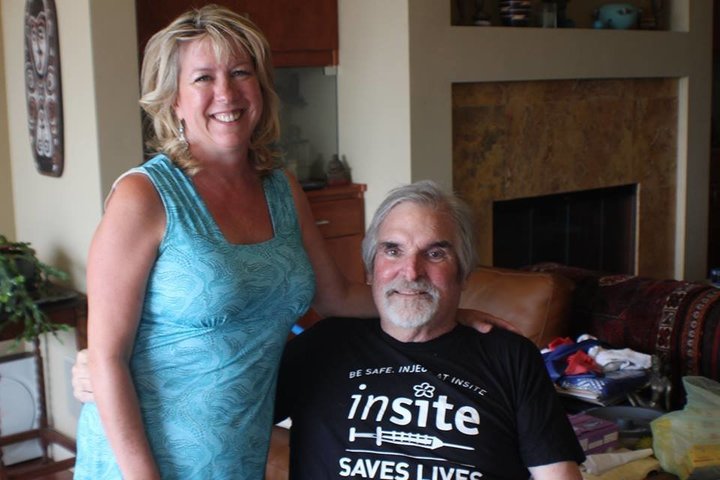UC San Diego professor of medicine Steffanie Strathdee recently received the 2018 Time Magazine honor for being one of the 50 most influential people in health care. The magazine recognized Dr. Strathdee’s success in helping advance a new treatment for superbugs in North America — bacteria which are resistant to antibacterial drugs — through the use of phage, or bacterial virus, therapy. This therapy administers phages into patients so that the phages infect superbugs and eliminate them.
Phage therapy is a beneficial technique because phages are specific to which bacteria they will latch onto and attack, meaning that they will not harm the body’s natural homeostasis. When the phage attacks the superbug, the phage will also replicate itself. This will allow more phages to kill more superbugs, until there are no more superbugs in the patient’s body.
Research into phage therapy began 100 years ago but stalled when penicillin was discovered. It had never been used to treat a US patient with a systemic superbug infection until Strathdee’s husband, UCSD professor of psychiatry Thomas Patterson, contracted an unusual type of bacterium while on vacation.
Conventional antibiotics did not stymie the bacteria’s growth, which led Strathdee to look into alternative methods to cure her husband. With the help of UCSD professor of medicine Robert Schooley, she developed a procedure to alleviate her husband’s ailment.
“The first thing we had to do was find phages that were active against his particular organism, and the only way to do that is to take the organism and have it grow in a laboratory,” Schooley explained to the UCSD Guardian. “What we needed to do was increase the pressure on the organism by treating it intravenously.”
Once the phages were administered, Patterson took only three days to start recovering. His initial condition, however, reflects a greater phenomenon occurring around the world.
With the heightened global use of antibacterial drugs, some bacteria have mutated to resist medication. These superbugs pose a great danger to many people because there is a limited number of treatments that address the issue.
“We’re at a point right now where the superbug crisis isn’t just hitting individual people; it is a global health crisis. Small scrapes can turn into something larger, even taking someone’s life,” Strathdee said to the Guardian. “It’s estimated [that by 2050,] 10 million people per year are going to die annually from multidrug resistant bacterial infections, or superbugs, unless we take urgent action.”
Patterson’s recovery went viral on the news, which led to Strathdee getting calls from other people facing similar ailments; the medical team took on five new patients, and all were cured using phage therapy. In an effort to explore the possibilities of this discovery and capitalize on the excitement surrounding it, Chancellor Pradeep Khosla organized for the university to help fund the new Center for Innovative Phage Applications and Therapeutics (IPATH), which became official in June 2018 and is under the direction of Strathdee and Schooley. Their first directive was to conduct research in order to better understand the nuances of the procedure.
“We need to do the clinical trials. What is the dosing? What is the frequency? What is the interaction of phage with antibiotics? We hope to get studies to answer these questions going in 2019,” Strathdee said. “Also, the regulatory framework needs to change. The Food and Drug Administration doesn’t have a model for [phages].”
Strathdee also hopes that IPATH can evaluate over-the-counter fixed phage cocktail preapproved by the FDA, which will help kill some superbugs like methicillin-resistant Staphylococcus aureus. However, other superbugs like the one Patterson had would need to be assigned specialized phages unique to the patient’s particular organism. To address this issue, IPATH is also hoping to evaluate personalized phage cocktails, which could someday also include genetically engineering the phages to expand the range of organisms they could eliminate.
“I’d like to see us learn how to use bacteriophages for multidrug-resistant infections, because they are a major problem in Africa, India, China, and Japan. I’d like to see this become something available throughout the world,” Schooley said.
Strathdee and her husband will release a new memoir in 2019 titled “The Perfect Predator.” The book will recount her and her husband’s firsthand experience with the superbug and how she needed to revitalize a forgotten cure to save him. It will also highlight the failures of current antibiotics and the potential for phage therapy to combat the global superbug crisis.
photo by Huffington Post
This article has been updated to clarify Dr. Strathdee’s role in advancing the treatment, as well as distinctions between her and IPATH’s hopes to evaluate phage cocktails rather than developing them.









John • Oct 29, 2018 at 6:07 pm
Uh . . . is this like the use of a phage cocktail to successfully cure a young boy of dysentery in France in 1919? Time Magazine might have spent more time researching a very rich topic. It’s like Dr. Strathdee walked into the local Kroger and discovered sliced bread on the bakery shelves. Today there are several phage-based products, FDA approved and commercially available, being used to eliminate bacterial contamination of human and pet food products. A large scale human clinical trial of a phage-based therapeutic is about to commence at Mount Sinai prior to the end of the year (targeting IBD).
Just wondering.